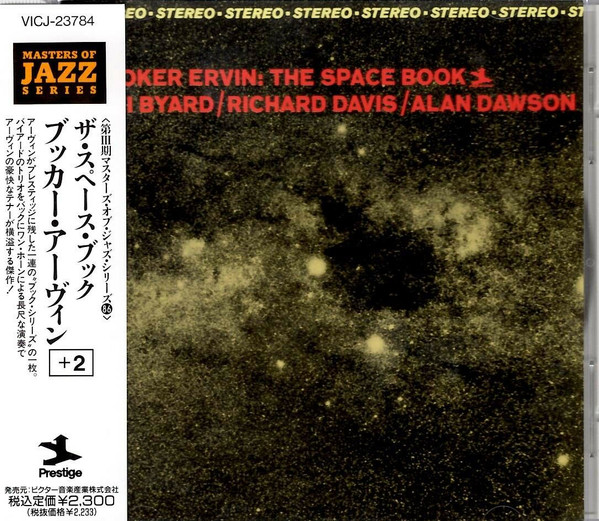LISTEN TO ONE: Number Two
The title of this album is The Space Book, and the cover art reflects it, with what appears to be a black hole in the Milky Way. The contents live up to the packaging. With this album, Ervin crosses over the bridge to free jazz, and free jazz is the better for it. Certainly with some of the free guys -- not the best ones -- aas with some of the abstract expressionists, or the practitioners of what came to be called L*A*N*G*U*A*G*E poetry, one can't help but wonder if they're doing all this crazy stuff to cover up the fact that can't really draw, can't really play a scale, can't really write a line of poetry that will scan.
Such is not the case with Ervin. He brings all his chops with him into outer space. It's not the case with the people in his group either. Jaki Byard could play anything, and frequently did. He has as much claim as anyone you can think of to be called the greatest unsung piano player of all time. Bassist Richard Davis, Ervin's longtime collaborator, could play anything, and his discography shows it -- Eric Dolphy and Pharaoh Sanders, Louis Armstrong and Bo Diddley. Drummer Alan Dawson also worked exrensively with Ervin, after which he replaced Joe Morello in the Dave Brubeck Quartet. Outer space, Booker Ervin style, was open range for these guys, and they were home on the range. They can play as fast as any bebopper, and they always know what they're doing.
You can count on it that I don't know enough about music to tell you what's going on in free jazz, so just let me say that this is a great album. It's free, it's structured, it's melodic, it's jagged, it's rhythmic, it's somewhere beyond rhythm. It sounds as fresh and original today as it did when it was recorded. The brilliance of Ervin's solos are matched by Byard and Davis.
Ervin plays two originals and two standards, neither of which you'd expect to find on a free jazz album -- George Gershwin's swing era classic "I Can't Get Started," and "There is No Greater Love." standaed bordering on schmaltz, first recorded by composer Isham Jones in 1936, covered by Guy Lombardo and then Jimmy Dorsey, before becoming, like "I Can'r Get Started," a ubiquitous standard. For both tunes, Ervin gives you enough of the melody that you can recognize it if you're listening for it.
Don Schlitten produced. Two cuts from the session, "The Second #2" and "Bass IX," were held over and appeared on the 1966 album, Groovin' High.


No comments:
Post a Comment